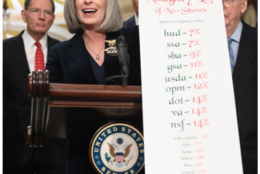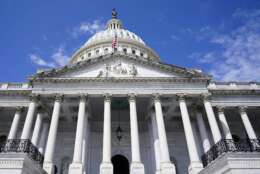Facilities/Construction
-
The FAA is setting four days in the office per pay period as a baseline for its workforce, but the agency is giving frontline managers the discretion to set in-office expectations for their employees.
January 03, 2024 -
A FEMA spokesperson told Federal News Network the new headquarters will include a larger space for FEMA’s National Response Coordination Center, and that the new space “fits the unique needs of emergency management.”
December 15, 2023 -
More than 15 years after the federal government first planned for a new FBI headquarters, the crumbling J. Edgar Hoover Building is breaking down in ways that hamper the agency’s mission.
December 13, 2023 -
On today's Federal Newscast: . Harry Coker has been confirmed as the next national cyber director. The Bureau of Prisons tries to deal with a 40% shortage of correctional officers nationwide. And as plans for a new FBI headquarters chug along, the old building falls apart.
December 13, 2023 -
The Navy is not quite certain how many ships and submarines it wants to build over the next few decades. In fact, it has offered three alternative plans to Congress, with varying timelines and price tags. For analysis, the Federal Drive with Tom Temin turned to the Senior Analyst for Naval Forces at the Congressional Budget Office, Eric Labs.
December 12, 2023 -
In today's Federal Newscast: The Small Business Administration is redefining small. The Cybersecurity and Infrastructure Security Agency is rolling out a new cybersecurity tool for agencies. And DARPA makes plans to build a booming economy on the moon.
December 12, 2023 -
Senate Small Business & Entrepreneurship Committee Ranking Member Joni Ernst (R-Iowa) says agencies still aren't making effective use of their office space.
December 06, 2023 -
The most talked about Government Accountability Office report confirmed what a lot of people suspected: Federal offices are largely unoccupied. It is a continuation of the situation during the pandemic. For more on the report, Federal News Network Deputy Editor Jared Serbu spoke with GAO's Acting Director of Physical Infrastructure, David Marroni.
December 06, 2023 -
The Federal Protective Service is still facing steep staff shortages amid a rise in threats to government employees and facilities.
November 29, 2023 -
The government is open on this short holiday week – and it will stay that way through at least the first couple months of the new year. That is thanks to a continuing resolution Congress passed and the president signed late last week. But the way Congress went about it is going to make things complicated – and maybe harder to pass full appropriations bills for 2024. For more on this, Federal News Network Deputy Editor talked with Mitchell Miller, WTOP Capitol Hill correspondent.
November 20, 2023 -
But with agencies — including GSA — embracing the benefits of a long-term hybrid and remote workforce, Carnahan said her agency sees an opportunity to reduce the government’s real-estate footprint by up to 30%.
November 14, 2023 -
Just because GSA has chosen a site for a new FBI building, doesn't mean anyone should be picking out carpets and drapes just yet.
November 09, 2023 -
A decade-long disagreement over where to build a new headquarters for the FBI is now settled. Federal officials confirmed Wednesday night that the General Services Administration has selected Greenbelt as the future home of the FBI headquarters.
November 08, 2023 -
“GSA and our agency partners will continue to assess space needs and accelerate the disposition of federal buildings that are underperforming, underused, or otherwise don’t use taxpayer dollars effectively,” Carnahan said.
November 08, 2023 -
Several agencies will get a part of $155 million from the Federal Permitting Improvement Steering Council. The money is aimed at helping agencies improve how they review and decide on applications for infrastructure construction.
October 25, 2023















